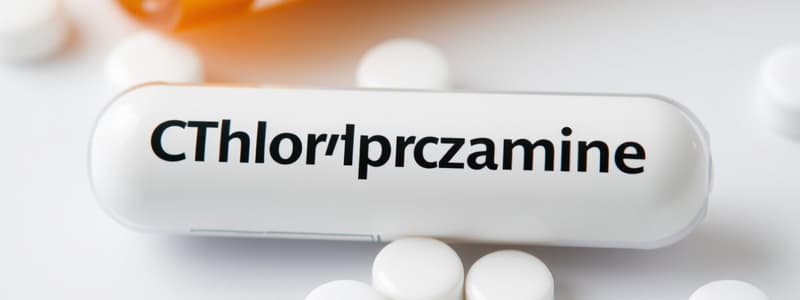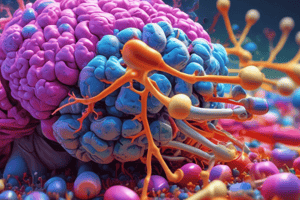Podcast
Questions and Answers
What are the classifications of chlorpromazine?
What are the classifications of chlorpromazine?
- Antidepressants
- Benzodiazepines
- Antiemetics, antipsychotics (correct)
- Narcotics
What is the action of chlorpromazine?
What is the action of chlorpromazine?
Alters the effects of dopamine in the CNS and has significant anticholinergic/alpha-adrenergic blocking activity.
Which of the following are side effects of chlorpromazine? (Select all that apply)
Which of the following are side effects of chlorpromazine? (Select all that apply)
- Neuroleptic malignant syndrome (correct)
- Tachycardia (correct)
- Euphoria
- Dry mouth (correct)
What are the indications for chlorpromazine?
What are the indications for chlorpromazine?
The typical oral dosage for adults suffering from psychoses is ____ mg 2-4 times daily.
The typical oral dosage for adults suffering from psychoses is ____ mg 2-4 times daily.
What are toxic symptoms associated with chlorpromazine?
What are toxic symptoms associated with chlorpromazine?
Which nursing implication should be regularly assessed during chlorpromazine therapy?
Which nursing implication should be regularly assessed during chlorpromazine therapy?
Flashcards are hidden until you start studying
Study Notes
Classifications
- Therapeutic classifications include antiemetics and antipsychotics.
- Pharmacologic classification: phenothiazines.
Action
- Alters dopamine effects in the central nervous system (CNS).
- Exhibits anticholinergic and alpha-adrenergic blocking activity.
- Therapeutic benefits: reduces psychosis symptoms, alleviates nausea/vomiting, and diminishes symptoms of porphyria.
Side Effects
- CNS: Potential for neuroleptic malignant syndrome, sedation, and various extrapyramidal reactions; risk of tardive dyskinesia.
- EENT: May cause blurred vision, dry eyes, and lens opacities.
- Cardiovascular: Risk of hypotension, particularly with IM or IV routes, and tachycardia.
- Gastrointestinal: Can lead to constipation, dry mouth, anorexia, and associated liver issues.
- Genitourinary: May cause urinary retention.
- Dermatological: Possible photosensitivity, pigment changes, and rashes.
- Endocrine: May result in galactorrhea and amenorrhea.
- Hematological: Risk of agranulocytosis and leukopenia.
- Metabolic: Hyperthermia may occur.
- Miscellaneous: Risk of allergic reactions.
Indications
- Second-line treatment for schizophrenia and psychoses after atypical antipsychotic failure.
- Effective for hyperexcitable, combative behaviors in children.
- Used for nausea, vomiting, and intractable hiccups.
- Preoperative sedation and treatment for acute intermittent porphyria.
- Unlabeled uses include vascular headaches and bipolar disorder.
Route/Dosage
- Oral (Adults): Doses for psychoses range from 10-25 mg 2-4 times daily, with a maximum of 1 g/day.
- For nausea: 10-25 mg as needed every 4 hours.
- Preoperative sedation: 25-50 mg 2-3 hours before surgery.
- Oral (Children): Dosage varies according to weight and condition.
- Intramuscular (IM) and Intravenous (IV) dosages available for adults and children, with specific dosing for severe psychoses, nausea, preoperative sedation, hiccups, and porphyria.
Toxic Symptoms
- No specific toxic symptoms listed.
Nursing Implications
- Conduct thorough assessments of mental status, weight, and BMI before and during treatment.
- Monitor vital signs (BP, pulse, respiratory rate) regularly, especially during dose adjustments.
- Observe for symptoms of akathisia and extrapyramidal side effects; treatment may include specific medications.
- Watch for tardive dyskinesia and neuroleptic malignant syndrome; these require immediate reporting to healthcare providers.
- Monitor for hyperprolactinemia symptoms, including menstrual irregularities and sexual dysfunction.
- Ensure proper fluid intake and manage bowel function to prevent constipation during therapy.
Studying That Suits You
Use AI to generate personalized quizzes and flashcards to suit your learning preferences.




